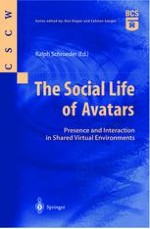2002 | OriginalPaper | Buchkapitel
30 Days in Active Worlds: Community, Design and Terrorism in a Virtual World
verfasst von : Andrew Hudson-Smith
Erschienen in: The Social Life of Avatars
Verlag: Springer London
Enthalten in: Professional Book Archive
Aktivieren Sie unsere intelligente Suche, um passende Fachinhalte oder Patente zu finden.
Wählen Sie Textabschnitte aus um mit Künstlicher Intelligenz passenden Patente zu finden. powered by
Markieren Sie Textabschnitte, um KI-gestützt weitere passende Inhalte zu finden. powered by
The idea behind "30 Days in Active Worlds" was to document fully the development of a virtual environment from beginning to end, as a plot of virgin virtual land which, it was hoped, would develop into a community and a fullyfledged new virtual world. The aim was not to create a dialog of life in the virtual environment, such as the well-documented My Tiny Life by Julian Dibbell [1] or The Cybergypsies by Indra Sinha [2]. Yet the events that unfolded over the 30 day period led to just such a documentation, and with it my views not only about community and design in a virtual environment, but also about the increasingly blurred boundaries between what is real and what is virtual. The title "30 Days in Active Worlds" stems from the free trial software of the Active Worlds (A W) server, which allows users to host their own world. The trial software operates for 30 days before timing out, enabling users to set up and run their own worlds and small communities before having to purchase a full server from A W. A W is a commercial multi-user system operating on a standard Windows-based system with a modem connection. Distributed and run from Newburyport, north of Boston, the A W Universe currently consists of over 700 worlds with an average of 400 users logged in at anyone time. Users, or citizens as they are known, appear as avatars. Avatars are the citizens’ graphical icons in the A W system, and the choice of avatars range from a large male biker called "Butch" to the petite female of "Tanya" with many incarnations in-between.
